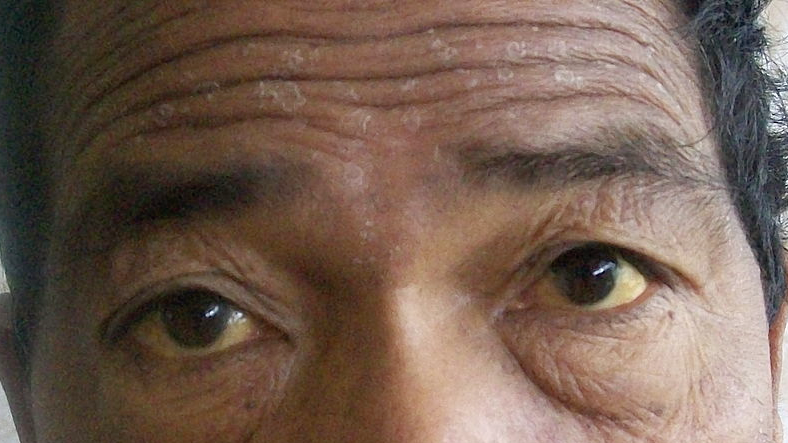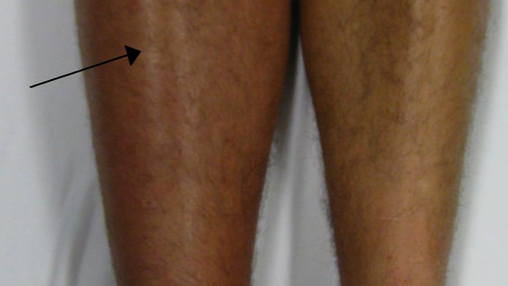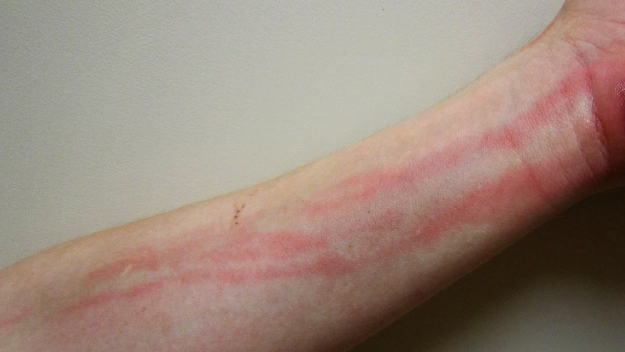Chest pain

There are many causes of chest pain, from things as minor as muscle spasms to things as serious and severe as a heart attack. If you experience chest discomfort or pain, pay attention to how quickly the sensation came on and whether or not it is increasing. This pain could be your body warning you that something seriously wrong is going on!
Changes in appetite

Your appetite changing, especially in sudden or dramatic ways, is one of the clearest signs that something might not be right with your health. Many health conditions can affect your digestive speed or ability to absorb certain nutrients, which can in turn cause you to crave different kinds of food. If you find yourself suddenly obsessed with carbs or sugars and you haven’t made any lifestyle changes, it may be worth looking into why.
Dizziness

If you haven’t been spinning around in circles and didn’t just stand up too quickly after a nap, then feeling dizzy is something to take note of. Sensations of vertigo or unsteadiness can be caused by many different factors, from gastrointestinal problems to issues with your vision, brain or inner ear, so it’s worth seeking medical help as soon as possible after protracted dizziness occurs.
Feeling weak

It’s normal to feel tired and sluggish after a bad night’s sleep, a busy day at work or a particularly intense session at the gym. However, feeling constantly fatigued is a sign that your body has been battling something behind the scenes. If no amount of rest is replenishing your internal reserves, that is a sign that something more is going on, whether that’s a vitamin deficiency or a chronic illness of some kind.
Vomiting

Catching a stomach bug, dealing with food poisoning or just having an upset tummy after overindulging might be unpleasant, but it is generally nothing to worry about. However, vomiting that continues for more than two days is a much bigger concern, both because it could lead to dangerous levels of dehydration and because it is a symptom of serious digestive or gastrointestinal issues.
Discoloured skin

You know the colour of your skin better than anyone. You know how it looks when it’s healthy, when it has caught the sun, or when it’s moisturised. That means that you’re also likely to notice when it is pale, blotchy, yellowing or grey. Discoloured skin is an indicator of many medical problems, some of which are otherwise difficult to spot and diagnose, and so any significant skin changes are worth speaking to a doctor about.
Mood swings

Taking care of your mental health is just as important as maintaining your physical health, and that means paying attention to how you’re feeling. If your mood is prone to swinging wildly between joy and sadness, and you’re not dealing with any new stressors in your life, then the problem could be physiological. Everything from PMS to mental illnesses like BPD can cause mood swings, and treating them is crucial to maintaining your mental well-being.
Never-ending cough

Having a cough is an accepted part of catching a cold or the flu, and even one that sticks around for a couple of weeks after other symptoms recede is not a huge worry. However, a cough that never goes away could indicate that something more is at play, from a chronic infection like tuberculosis to lung problems like bronchitis.
Joint pain

Joint pain is often looked at as a natural part of getting older or a consequence of working too hard at the gym. However, if your joints are creaky, aching or stiff and you haven’t made any lifestyle changes that could explain this discomfort, you could be dealing with a disorder like rheumatoid arthritis or osteoarthritis.
Shortness of breath

Struggling to breathe in any capacity, especially if you haven’t just exercised, should be a cause for concern. Shortness of breath could indicate conditions such as asthma, heart failure, pneumonia, or a blood clot in your lungs. If shortness of breath occurs suddenly, and especially if it’s accompanied by chest pain, weakness and changes to the colour of your skin, contact 911 straight away.
Intense headaches

Headaches are common and typically harmless but a sudden onset of an intense headache with accompanying confusion, weakness, or seizure are reasons to seek immediate medical help. These signs could indicate a stroke, aneurysm, or head injury. Take ordinary precautions at first, drink some water, rest and have some ibuprofen if possible. If problems persist, call a doctor.
Allergic reactions

Allergic reactions are one of those conditions that can be either mildly uncomfortable or outright dangerous. If you’ve eaten something and find yourself breaking out in hives and a drop in blood pressure, your body may be going into shock. This allergic reaction can be life-threatening so call 911 as soon as possible. An allergic reaction can normally last from a few hours to a few weeks. Prolonged exposure to your allergen will result in longer recovery times.
Unusual bleeding

We’re all made of blood. We need it to survive. But we shouldn’t see it in certain places. Blood in your urine may be a sign of bladder cancer, kidney disease, UTIs, or anaemia. Blood in your poo may be a sign of colon cancer or inflammatory bowel disease. Coughing blood could be linked to lung cancer, so you can never be too cautious when seeking out attention for these symptoms.
Sores that won’t heal

Flashes of light

Swollen legs

Abdominal pain

Fever

Confusion

Life can be tough and draining. It can often make us feel exhausted as if we’re losing our grip on reality. But any confusion or delirium that comes on quickly and is accompanied by mumbling, grogginess and struggling to focus has many potential causes. These can include carbon monoxide poisoning, Parkinson’s disease, stroke, seizures, cancer, and infection. Seek out medical attention if you’re concerned.
Bowel movement habits

Numbness

Breast changes

Sudden weight loss

Weight fluctuation is a very normal part of living a varied life. After all, most people experience periods of both high activity and rest, as well as phases of both healthy eating and indulgence. With that being said, all people have a maintenance weight at which their body naturally sits, and any weight fluctuation outside of that should be gradual. If you have suddenly lost a lot of weight in a short amount of time and aren’t sure why, it could be the fault of a medical condition or illness.
Rash on one side of your body

Vaginal discharge

Constant indigestion or heartburn

Reoccurring indigestion and heartburn could be down to a bad, fatty diet. However, it could be a sign of cardiovascular disease. This is the number one killer in women and not something to be ignored. The symptoms aren’t nearly as clear as they are in men so if something feels afoot, don’t hesitate to get it checked out, and make sure to cut down on the sugary and salty snacks.
Changes in size or colour to moles

Losing hair

Vaginal bleeding

Vaginal bleeding should never be taken lightly. Post-menopausal bleeding is often a clear sign of uterine cancer. A diagnosis is made with a sonogram. Although uterine cancer is pretty rare, locking it down as early as possible to prevent it from spreading is vital. Talk to your doctor if you’re bleeding from your vagina and not on your menstrual period. The will perform an exam and determine your diagnosis.
Constant thirst

Jaw and back pain

Black poo

Frequent urination

Do you find yourself having to wee all the time, even if you aren’t drinking that much? This could be a sign of diabetes. The need for constant urination is usually paired with fatigue and constant thirst. However, having to wee more often than usual can also be a sign of bladder infections. Be sure to organise a visit with a healthcare professional to see what’s up.
Expanding waistline

Expanding waistlines aren’t just associated with unhealthy eating but with underlying problems, you may not know about. For instance, belly fat is a symptom of heart disease. Fluid build-up usually causes the abdomen to expand, and that typically indicates there is some kind of liver or heart problem at hand. If you aren’t shedding through regular means – dieting, jogging, etc. – you may want to see a doctor.
Metallic taste in your mouth

Did you know 90% of adults with kidney disease don’t know they have it? That’s because the symptoms are so subtle. Keep an eye out for “ammonia breath”, or a metallic taste in the mouth. The waste build-up in the body can cause changes to your mouth and how you taste. A medical professional will be able to help you out if problems persist.
Hiccups

Frank’s sign

Frank’s sign – a diagonal crease on one of your earlobes – isn’t always symptomatic of something terrible, but it’s worth bringing up with your doctor as it could indicate coronary artery disease, peripheral vascular disease, and cerebrovascular disease. You’re not alone in this. There are many public figures with Frank’s sign, including Dick Van Dyke and Steven Spielberg.
Double vision

If you begin to see double or find one or both of your eyelids drooping, this can be an indication of a brain aneurysm. Don’t tread carefully here: go and consult your doctor for a second opinion, as these things can rapidly progress into more serious symptoms. Even if your double vision turns out to be benign, it will still impact your daily life and ability to perform routine tasks.
Night sweats

Suicidal thoughts

Depression is a common human condition. If you’re simply struggling to complete everyday tasks that you usually complete with ease, you may be experiencing symptoms of depression. Thankfully, research and treatment have never been better. Don’t hesitate to contact the National Suicide Prevention Hotline at 1–800–273–8255 if you’re feeling low.
Hard lymph nodes

There are approximately 800 lymph nodes scattered throughout the body, with most concentrated around the neck, groin and abdomen. Most people are familiar with the painful, swollen glands that indicate an infection, and these are rarely a cause for concern. However, hard, immovable lymph nodes that appear suddenly are often one of the first signs of lymphoma, a common cancer that affects the lymphatic system.
Inappropriate laughing or crying

Schizophrenia is a debilitating and poorly understood condition, characterised by delusions and hallucinations. Whilst there isn’t a cure, a combination of medication and therapy can go a long way towards helping those afflicted live a normal life with minimal symptoms. One of the first symptoms of schizophrenia to emerge is a tendency to laugh or cry at inappropriate moments.
Unexplained pain

Pain is your body’s way of letting you know that something is wrong. Most of the time it’s clear why pain is occurring, for example, because we’ve got a cut or bruise, but sometimes there is no obvious cause. If you’re struggling with persistent, unexplained pain, go see a doctor as soon as you can. It could be a tumour pressing against a nerve, or a hernia that’s getting worse, but whatever the cause, the earlier it’s addressed the higher the chance of a positive outcome will be.
Yellow eyes or fingertips

Jaundice is caused by an increase of bilirubin in the blood, often as the result of liver disease, and it’s never a good sign. Most people are aware that yellowing of the eyes is the main symptom of jaundice and should be medically evaluated as a matter of urgency, but what’s less well-known is that the condition can also affect fingertips. This more subtle sign is often missed, with people only realising there’s a problem when other, more serious symptoms develop.
Cold arms or legs

If your appendages constantly feel cold, no matter what you do, it’s time to book an appointment with a doctor. As coronary heart disease progresses, the blood vessels in arms and legs can narrow, restricting circulation and leading to a constant chilly feeling. Fortunately, a combination of medication and lifestyle changes can normally prevent a diagnosis of heart disease from being a death sentence.
Increasingly severe period pain

Periods are an inconvenient part of being a woman, but, while they’re never going to be pleasant, they should be relatively consistent in their unpleasantness. A little bit of variation month to month is nothing to be alarmed about, but if your periods are getting increasingly painful then you need to visit a gynaecologist to get checked for tumours or other growths.
Strong emotions that occur for no reason

A little bit of emotional instability from time to time is completely normal and usually just means you’re suffering from stress. However, if you’re experiencing intense emotions that seem to bubble up from nowhere and are completely inappropriate for the situation, it could be an early warning that you’re dealing with BPD, a mental illness typified by extreme mood swings.
Abnormal height

If you tower over the rest of your family by the time you hit high school, you could have hit the genetic jackpot, or there could be something sinister going on. Acromegaly is a condition characterised by extremely elevated levels of growth hormone, and, whilst it can have a range of causes, the most common is a tumour on the pituitary gland.
Leg pain with activity

Osteosarcoma is a malignant type of cancer that starts in bones, although it can quickly spread to other parts of the body. Whilst it’s possible for osteosarcoma to start in any bone, it usually starts in the legs, close to the knee. The most common symptom is a deep, aching pain that gets worse with activity, although as the cancer progresses the pain often starts flaring up during the night.
Craving ice

Crunching a mouthful of ice cubes might seem like a harmless thing to do, but it could point to a serious underlying condition. Anaemia is the clinical term for an iron deficiency, and symptoms include lethargy, weakness, shortness of breath… and a bizarre craving for ice. Despite extensive research, it remains unclear why anaemia can cause this truly bizarre symptom, but it is believed to occur in over half of all cases.
Testicular pain

Many people brush off aching testicles, assuming they’ve just taken a bit of a knock. Occasionally, though, testicular pain is caused by torsion, a condition in which the spermatic cords that attach to each testicle get twisted around each other. This cuts off blood flow and requires a prompt surgical intervention to save the testicles, which can otherwise die within a matter of hours.
Warmth and redness on the legs

A deep vein thrombosis is a blood clot that forms within a vein, most often in the legs. DVTs can quickly turn fatal if the clot breaks off and travels to the heart, lungs or brain, where it can cause lethal issues such as strokes and embolisms. One of the first signs of a DVT is pain a warm, red patch, typically on a person’s thigh or calf, which may or may not be sore to the touch.
Red lines appearing around a cut

Even minor cuts and wounds can prove fatal if the wrong kind of bacteria gets inside them. One of the clearest signs that the infection from a wound is spreading is the appearance of thin red lines that originate at the cut and spread out. These can be subtle, and many people either don’t notice this alarming sign or ignore it entirely, risking a dangerous bout of sepsis.
Persistent itchiness

Itchy skin can be caused by a range of harmless skin conditions, or simply by contact with an irritant. However, severe, persistent itchiness that doesn’t appear to have a cause and lasts a long time should always be evaluated by a medical professional. The most common serious cause of itchiness is lymphoma, but it can also be caused by other cancers and liver conditions.
Brain fog

Brain fog is a symptom of many psychiatric disorders including depression, anxiety and chronic stress, but it can also be a product of a number of diseases. One of the most pernicious is Lyme disease, a bacterial infection usually transmitted via the bite of a tick. Other symptoms include debilitating fatigue and joint pain, and the condition often lasts for years.
Pain when drinking alcohol

One of the hallmark symptoms of non-Hodgkins lymphoma is a pain in the lymph nodes that occurs when alcohol is ingested. It’s not clearly understood why this occurs, but it’s often one of the first symptoms that leads to a diagnosis. As well as pain, sufferers of non-Hodgkins lymphoma might experience intense nausea that kicks in within minutes of drinking booze.
Iron deficiency

Iron deficiency is in itself a condition, but it can also suggest another underlying problem. If a blood test has revealed that you have an iron deficiency, and iron supplements don’t seem to be helping, it might mean that you have a gastrointestinal disease that is preventing nutrients from absorbing. The most likely culprits are coeliac, Crohn’s or ulcerative colitis.
Balance problems

Issues with balance, such as regularly tripping or falling over, should be urgently checked out by a doctor, especially if it’s not something you’ve dealt with your whole life. If you’re lucky, they’re caused by a problem with the part of your inner ear that regulates balance. If you’re not, you could be dealing with a serious neurological disorder like ALS, a fatal disease which affects motor neurones.
Feeling full after a few mouthfuls

If you find yourself constantly throwing food away because every time you start eating you feel full after a few mouthfuls, it’s time to get checked out. A number of conditions can cause this symptom, ranging all the way from GERD and peptic ulcers to aggressive stomach cancers. Whatever the cause, the outcome will almost always be better with early intervention.
Light sensitivity

Lupus is an autoimmune disease, which means the body’s immune system targets its own organs and tissues. As the condition progresses it tends to lead to increasingly severe symptoms, including rashes, joint pain and hair loss. However, in its early stages, the only symptom is often a sensitivity to light, which tends to come and go.
Falling energy levels

It’s normal for baseline levels of energy to fluctuate, and they can be impacted by everything from the quality of your sleep to periods of heightened stress. On the other hand, if you notice that your energy levels are consistently getting lower and lower, it could indicate a problem with your thyroid, a small gland in the throat that produces a number of important hormones.
A cold that just won’t go away

Seasonal colds are an irritating fact of life that no one can escape. However, if you have a cold that just refuses to budge, it might be because it’s not a cold at all and is instead something more sinister. A range of serious illnesses including various kinds of cancer can mimic cold symptoms like a runny nose and sore throat, so you should definitely see a doctor if you’ve been feeling under the weather for more than three weeks.
Forgetting how to do things

If you’re suddenly finding yourself forgetting how to do things you’ve never struggled with before, chances are there’s something going on with your brain that needs to be assessed by a neurologist. It could be an early sign of Alzheimer’s, or it could be a tumour pressing into your brain. This doesn’t mean you should panic every time you forget something, but if you’re struggling with basic tasks or failing to remember the pin for your phone, it’s time to seek medical help.
Period dates changing

In general, your period should run on a roughly 28-day cycle. Whilst a little bit of variation is normal, if your period keeps coming drastically early or late it could mean there’s something going on with your hormones. One of the most likely possibilities is an under or overactive thyroid, but it could potentially be a more serious condition like Hashimoto’s disease.
Changes in sense of smell

Brain tumours can cause a huge range of symptoms, depending on which parts of the brain they press on to as they grow. However, one of the most common signs is a change in one’s sense of smell. This commonly takes the form of persistently noticing odours that no one else can smell, with many describing a constant scent of rotting eggs or chemicals that seems to follow them everywhere.
A shrinking mole

Most people are aware that a rapidly growing mole is a cause for concern. However, what’s less commonly known is that a shrinking mole can also spell trouble. When a mole turns cancerous the immune system will begin to attack it, which can actually cause a reduction in size. Unfortunately, there’s still a high chance of the cancer spreading, and so the best course of action is to have the affected mole removed surgically.
Lack of emotion

When people think about depression, they usually imagine intense, crippling sadness that makes it nigh-on impossible to function. While it absolutely can manifest in this way, depression can also present as a complete lack of emotion. Because it doesn’t fit the standard perception of the disorder, many people with this symptom never seek psychiatric help, and consequently don’t get the support they need.
Difficulty swallowing

Difficulty swallowing is often chalked up to the onset of a cold or flu, but, whilst it certainly can be caused by minor viruses, it can also indicate a more serious problem. If you’ve been struggling to swallow for more than a week or two, especially if it’s getting more difficult, book an appointment with an ENT and request that they thoroughly check for throat cancer.
Twitching eyelids

Eyelid twitches are an extremely common symptom that rarely points to a serious condition, with stress, anxiety or a slight magnesium deficiency normally explaining the involuntary movements. However, if your eyelid has been twitching for over three weeks, it’s a good idea to get yourself assessed for neurological conditions such as multiple sclerosis or Parkinson’s.
Snoring

Snoring might be extremely annoying for the partners of people who suffer from it, but it’s generally harmless. Sometimes, though, extreme snoring can be a sign of sleep apnea, a condition which causes people to suddenly stop breathing throughout the night. If left untreated, sleep apnea can eventually cause damage to the heart, and in severe cases, it can even be life-threatening.